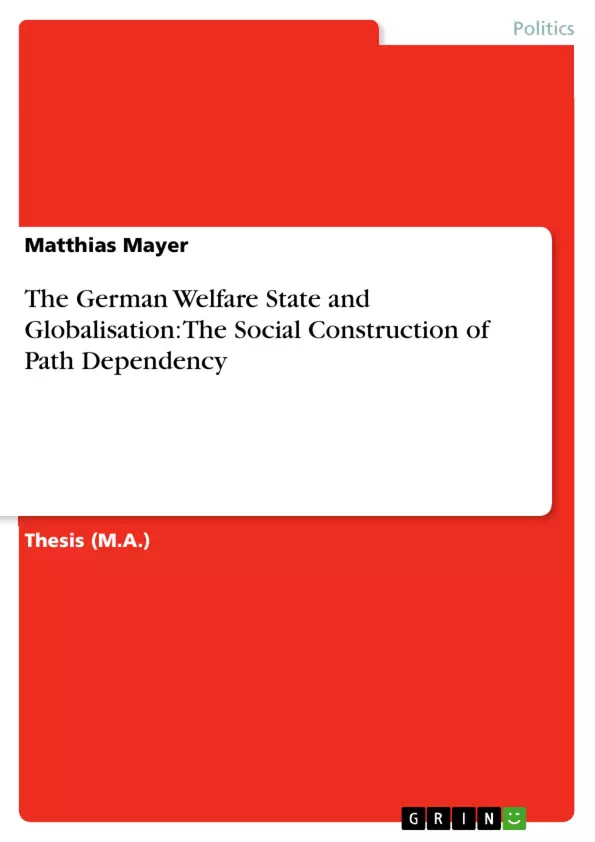Economic globalisation seems to have intensified the claims that an extensive national welfare state is no longer sustainable under high exposure to global competition. However, the evidence for significant welfare dismantlement in Germany is missing. In this dissertation, I endeavour to analyse, why globalisation does not seem to have had any significant impact on the German welfare state in terms of serious downwards reform. I contend that the actual impact of economic globalisation on the national welfare state depends a great deal, on how it is interpreted domestically. Hence, I would like to regard the impact of globalisation not only as an exogenous force, but also as a result of what national policy makers, media, electorate, etc. interpret it to entail. In other words, although globalisation really seems to strain existing welfare structures, policy makers still have a considerable scope how to react to these pressures. For my endeavour, I introduce a historical institutionalist framework of path-dependency, which I confront with a social constructivist framework. Prima facie, the path-dependency theorem seems to hold for the German welfare state. However, I claim that a social constructivist angle is able to illuminate how the institutional constraints propagated by the path-dependency thesis can be overcome. Institutional constraints continue to impede welfare reform in German only because the German political elite failed to socially construct the imperative of reform in public discourse, leaving the great majority of the German population unwilling to accept fundamental cutbacks in social benefits. I argue that the Schröder administration attempted to legitimise cutbacks in social services through referring to exogenous pressures of globalisation. In addition, the media discusses the increased need for welfare state reform in the context of globalisation. Although, there seems to be a trend of mounting acceptance of welfare reform among the German population, the general level for support of such measures remains low. I attempt to show that the notion of globalisation on its own appears unable socially construct the public acceptance of serious welfare state reform. Hence, the most likely scenario for the near future of the German welfare state seems the absence of reform until the prolonged economic crisis legitimises significant transformations of the current system.
Inhaltsverzeichnis (Table of Contents)
- Introduction
- Literature review
- The German welfare state - normative principles and development
- Economic globalisation and the welfare state - downwards pressure?
- Retrenchment theory
- Historical institutionalism
- Social constructivism
- Case study
- Is Germany globalised?
- Globalisation of political discourse
- Globalisation in media discourse
- Quantitative change in social spending
- Qualitative impact
- The welfare state and popular sentiment
- Discussion
- Path-dependency versus public discourse?
- Relation between historical institutionalism and social constructivism
- The mystery of the nonconstructed reform necessity
Zielsetzung und Themenschwerpunkte (Objectives and Key Themes)
This dissertation examines why economic globalization has not led to significant welfare state retrenchment in Germany, despite widespread claims of such a trend. It seeks to explore the interplay between historical institutionalist and social constructivist perspectives to explain this phenomenon.
- The impact of globalization on the German welfare state
- The role of path-dependency in shaping welfare state policies
- The significance of social construction of public discourse in influencing reform
- The role of political actors, media, and public opinion in shaping perceptions of globalization
- The implications of globalization for the future of the German welfare state
Zusammenfassung der Kapitel (Chapter Summaries)
- Introduction: Introduces the research question and outlines the theoretical framework of path-dependency and social constructivism, highlighting their relevance to understanding the German welfare state.
- Literature Review: Provides a comprehensive review of relevant literature on the German welfare state, economic globalization, retrenchment theory, historical institutionalism, and social constructivism.
- Case Study: Examines the empirical evidence of globalization's impact on the German welfare state through an analysis of economic integration, political discourse, media discourse, social spending, qualitative reform measures, and public sentiment.
- Discussion: Discusses the strengths and limitations of the theoretical framework, analyzes the paradox of path-dependency and public discourse, and explores reasons for the absence of significant welfare reform.
Schlüsselwörter (Keywords)
The dissertation focuses on the German welfare state, economic globalization, path-dependency, social constructivism, public discourse, political economy, media discourse, social spending, and public opinion.
Frequently Asked Questions
Why hasn't globalization led to significant welfare cuts in Germany?
The dissertation argues that institutional path-dependency and the failure of political elites to socially construct a public acceptance for reform have prevented major retrenchment.
What is "Path-Dependency" in welfare state theory?
Path-dependency suggests that once a country has established certain welfare institutions, they become resistant to change due to established interests and high costs of switching systems.
How does Social Constructivism explain welfare reform?
Social constructivism focuses on how globalization is interpreted by media, politicians, and the public; reform only happens if these actors successfully frame it as an unavoidable necessity.
What was the role of the Schröder administration in this context?
The Schröder administration attempted to justify cutbacks by citing exogenous pressures from globalization, but public support for fundamental changes remained low.
Does globalization inherently force a "race to the bottom" for social spending?
While globalization strains welfare structures, the research shows that national policy makers still have significant scope in how they choose to react to these pressures.
- Citation du texte
- Master of Science Matthias Mayer (Auteur), 2005, The German Welfare State and Globalisation: The Social Construction of Path Dependency, Munich, GRIN Verlag, https://www.grin.com/document/59452



